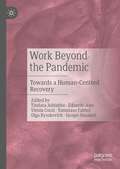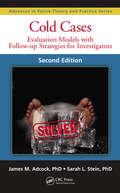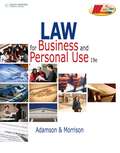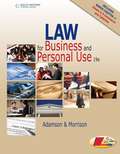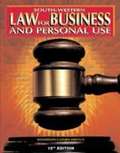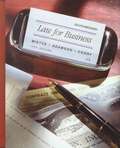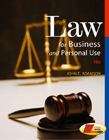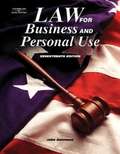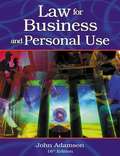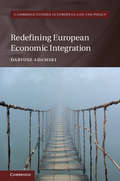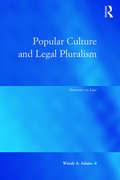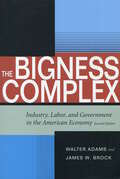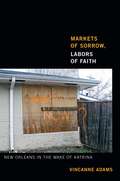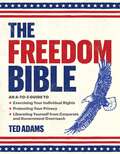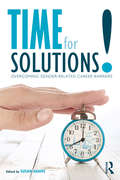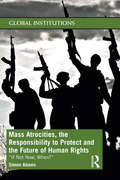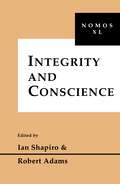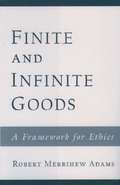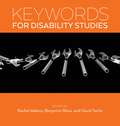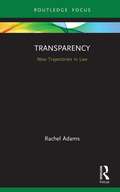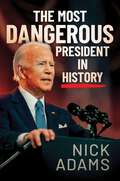- Table View
- List View
Work Beyond the Pandemic: Towards a Human-Centred Recovery
by Tindara Addabbo Edoardo Ales Ylenia Curzi Tommaso Fabbri Olga Rymkevich Iacopo SenatoriThis book addresses the impact of Covid-19 on employment relations and provides a reconstruction and a critical assessment of the measures enacted worldwide to tackle the economic and social crisis triggered by the global health emergency. The pandemic has been a booster of critical issues that for years have been silently shaping society and the labor market and so it can represent an opportunity to relaunch a critical analysis on the future of work.Beginning from this assumption, this book collects contributions from different disciplines, including law, economics and organization theory. It covers topics such as the measures enacted to protect workers’ health and cushion the labour, the new inequalities that emerged during the pandemic and the strategies to construct a sustainable and human-centred development in the post pandemic scenario. It is highly relevant to scholars and students of organisation studies, resilience, the labour market and labour law.
Cold Cases: Evaluation Models with Follow-up Strategies for Investigators (Advances In Police Theory and Practice Series)
by James M. Adcock Sarah L. SteinBecause the investigation of cold cases is usually an arduous and time-consuming task, most law enforcement agencies in the United States are not able to dedicate the resources necessary to support the cold case investigation process. However, when those cases are fully pursued and prosecuted, they often result in convictions and lengthy prison terms. <p><p>Cold Cases: Evaluation Models with Follow-up Strategies for Investigators, Second Edition saves law enforcement time by providing detailed guidelines for determining if a cold case is solvable, and if so, how to organize, manage, and evaluate the investigation. It also provides techniques for developing investigative strategies to complement the evaluation process and resolve the crime. <p><p>This second edition features a new revised model and methodology for investigating cold cases suitable for all police and public safety agencies--large or small, domestic or international. This new model is more expeditious and convenient for departments that have less manpower and experience in dealing with cold cases. It emphasizes the prioritization of cold cases based on the availability of physical evidence and the chances of deriving matches from said evidence and an identified person of interest. <p><p>Additional topics covered in the second edition include: - How cases go cold - Strategies for creating a cold case unit - Cold Case investigations in a Dutch educational environment--a chapter written by members of the Dutch Police Academy - New forensic Science technologies, including DNA, CODIS, and AFIS - Case studies demonstrating advances in suspectology - Strategies for effective investigative interviewing - Challenges posed by staged crime scenes in cold cases - How to craft a cold case evaluation report <p>The expert authors of this book maintain The Center for the Resolution of Unresolved Crimes
Cold Cases: Evaluation Models with Follow-up Strategies for Investigators, Second Edition (Advances in Police Theory and Practice)
by James M. Adcock Sarah L. SteinBecause the investigation of cold cases is usually an arduous and time-consuming task, most law enforcement agencies in the United States are not able to dedicate the resources necessary to support the cold case investigation process. However, when those cases are fully pursued and prosecuted, they often result in convictions and lengthy prison terms. Cold Cases: Evaluation Models with Follow-up Strategies for Investigators, Second Edition saves law enforcement time by providing detailed guidelines for determining if a cold case is solvable, and if so, how to organize, manage, and evaluate the investigation. It also provides techniques for developing investigative strategies to complement the evaluation process and resolve the crime.This second edition features a new revised model and methodology for investigating cold cases suitable for all police and public safety agencies—large or small, domestic or international. This new model is more expeditious and convenient for departments that have less manpower and experience in dealing with cold cases. It emphasizes the prioritization of cold cases based on the availability of physical evidence and the chances of deriving matches from said evidence and an identified person of interest.Additional topics covered in the second edition include: How cases go cold Strategies for creating a cold case unit Cold case investigations in a Dutch educational environment—a chapter written by members of the Dutch Police Academy New forensic science technologies, including DNA, CODIS, and AFIS Case studies demonstrating advances in suspectology Strategies for effective investigative interviewing Challenges posed by staged crime scenes in cold cases How to craft a cold case evaluation report The expert authors of this book maintain The Center for the Resolution of Unresolved Crimes and conduct training and consulting worldwide. Their practical book is designed to help law enforcement agencies resurrect long-forgotten cases, bringing closure to victims and holding accountable those who are responsible. This book is part of the Advances in Police Theory and Practice series
Law For Business And Personal Use
by John Adamson Amanda MorrisonExplore the foundations of business law as well as the application of legal concepts to everyday life. LAW FOR BUSINESS AND PERSONAL USE, 19E, combines strong content and interactive technology with consistent, proven instruction to maintain student interest and support active learning. Coverage includes contracts, criminal law, environmental law, family law, and consumer protection. With more than 1,000 cases, LAW FOR BUSINESS AND PERSONAL USE, 19E, offers plenty of opportunities for case analysis and research.
Law for Business and Personal Use
by John E. Adamson Amanda MorrisonLAW FOR BUSINES AND PERSONAL USE, 19E provides instruction on the foundations of business law as well as the application of legal concepts to everyday life.
Law for Business and Personal Use
by John E. Adamson Norbert J. MietusThis 15th edition of Law for Business and Personal Use maintains a fundamental emphasis on business law, while introducing personal law topics that interest students. Give your students the most comprehensive coverage of contracts, ethics, employment law, credit, banking, partnerships, bankruptcy, etc.
Law for Business
by John E. Adamson Edward J. Conry Norbert J. MietusThis text effectively teaches an understanding of legal obligations and rights in business, and how to avoid legal difficulties. Law For Business effectively covers areas such as computer law, financial crimes, legal careers, environmental law, international law, and more.
Law for Business and Personal Use
by John E. AdamsonAdamson (business, Southwest Missouri State University) outlines the U. S. legal system and explains how various laws apply to the rights and duties of small businesses. The 32 chapters discuss civil procedure, contract law, leasing of real property, wills and trusts, employment law, legal forms of business organization, and financial transactions. Annotation ©2006 Book News, Inc. , Portland, OR (booknews. com)
Law for Business and Personal Use
by John E. AdamsonAdamson (business, Southwest Missouri State University) outlines the U. S. legal system and explains how various laws apply to the rights and duties of small businesses. The 32 chapters discuss civil procedure, contract law, leasing of real property, wills and trusts, employment law, legal forms of business organization, and financial transactions. Annotation ©2006 Book News, Inc. , Portland, OR (booknews. com)
Law for Business and Personal Use (16th edition)
by John E. AdamsonAdamson (business, Southwest Missouri State University) outlines the U. S. legal system and explains how various laws apply to the rights and duties of small businesses. The 32 chapters discuss civil procedure, contract law, leasing of real property, wills and trusts, employment law, legal forms of business organization, and financial transactions.
Redefining European Economic Integration (Cambridge Studies In European Law And Policy)
by Dariusz AdamskiEuropean economic integration has relied on policies intended to make the European Union strong and resilient economically, socially and politically. The Eurozone crisis and Brexit have demonstrated, however, how fragile this hope was and how contested reforms to the major European economic policies have become.<P><P> Dariusz Adamski explains the evolution of these policies - from the Economic and Monetary Union to the internal market, international trade, the EU's climate policy, as well as its redistributive policies - and demonstrates how this evolution has made European economic integration increasingly frail. He shows how erroneous economic and political assumptions regarding the direction of the European integration project have interplayed with the EU's constitutional context. Arguing that flaws in individual policies contributing to European economic integration can be remedied in compliance with the existing constitutional setup, he explains why such solutions would be economically beneficial and politically feasible.<P> Demonstrates the relationship between national policies and the travails of European economic integration.<P> Explains which economic and political theories are useful in understanding the current state of European integration and which can serve as guidelines for reforming it.<P> Will appeal to readers with backgrounds in EU law, economics and politics alike.
Popular Culture and Legal Pluralism: Narrative as Law (Law, Justice and Power)
by Wendy A AdamsDrawing upon theories of critical legal pluralism and psychological theories of narrative identity, this book argues for an understanding of popular culture as legal authority, unmediated by translation into state law. In narrating our identities, we draw upon collective cultural narratives, and our narrative/nomos obligational selves become the nexus for law and popular culture as mutually constitutive discourse. The author demonstrates the efficacy and desirability of applying a pluralist legal analysis to examine a much broader scope of subject matter than is possible through the restricted perspective of state law alone. The study considers whether presumptively illegal acts might actually be instances of a re-imagined, alternative legality, and the concomitant implications. As an illustrative example, works of critical dystopia and the beliefs and behaviours of eco/animal-terrorists can be understood as shared narrative and normative commitments that constitute law just as fully as does the state when it legislates and adjudicates. This book will be of great interest to academics and scholars of law and popular culture, as well as those involved in interdisciplinary work in legal pluralism.
The Bigness Complex: Industry, Labor, and Government in the American Economy, Second Edition
by Walter Adams James W. BrockThe Bigness Complex confronts head-on the myth that organizational giantism leads to economic efficiency and well-being in the modern age. On the contrary, it demonstrates how bigness undermines our economic productivity and progress, endangers our democratic freedoms, and exacerbates our economic problems and challenges. This new edition has a thoroughly updated variety of issues, examples, and new developments, including government bailouts of the airline industry; regulation of biotechnology; the fiasco of recent electricity deregulation; and mergers and consolidations in oil, radio, and grocery retailing. The analysis is framed in the timeless context of American distrust of concentrations of power. The authors show how both the left and the right fail to address the central problem of power in formulating their diagnoses and recommendations. The book concludes with an alternative public philosophy as a viable guidepost for public policy toward business in a free-enterprise democracy.
Markets of Sorrow, Labors of Faith: New Orleans in the Wake of Katrina
by Vincanne AdamsMarkets of Sorrow, Labors of Faith is an ethnographic account of long-term recovery in post-Katrina New Orleans. It is also a sobering exploration of the privatization of vital social services under market-driven governance. In the wake of Hurricane Katrina, public agencies subcontracted disaster relief to private companies that turned the humanitarian work of recovery into lucrative business. These enterprises profited from the very suffering that they failed to ameliorate, producing a second-order disaster that exacerbated inequalities based on race and class and leaving residents to rebuild almost entirely on their own. Filled with the often desperate voices of residents who returned to New Orleans, Markets of Sorrow, Labors of Faith describes the human toll of disaster capitalism and the affect economy it has produced. While for-profit companies delayed delivery of federal resources to returning residents, faith-based and nonprofit groups stepped in to rebuild, compelled by the moral pull of charity and the emotional rewards of volunteer labor. Adams traces the success of charity efforts, even while noting an irony of neoliberalism, which encourages the very same for-profit companies to exploit these charities as another market opportunity. In so doing, the companies profit not once but twice on disaster.
The Freedom Bible: An A-to-Z Guide to Exercising Your Individual Rights, Protecting Your Privacy, Liberating Yourself from Corporate and Government Overreach
by Ted AdamsLearn How to Protect Your Family&’s Freedom!Freedom is the foundation on which America was born and continues to thrive. If you believe in the strength of freedom as more than an ideal, you can find smart ways to exercise it in all parts of your life! The Freedom Bible is your A-to-Z guide to knowing your individual rights and seeking more control and freedom through the decisions you face every day.Own healthcare decisions for you and your familyMake choices that direct your dollars where you want—for example, made in America, not overseasKnow your options to challenge governing boards—from home ownership associations to school boardsReduce your reliance on &“the grid&”Escape the invasiveness of all kinds of technologyGuard your privacy and free speech on social mediaAnd much more!Get freedom from…· Big Government· Big Tech· Dependence on Overseas Goods· Employer &“Requirements&”· HOAs· Social media jail· Spam callers· Taxes· And More!
Time for Solutions!: Overcoming Gender-related Career Barriers
by Susan M. AdamsTime for Solutions! Overcoming Gender-related Career Barriers shares the who, what and how to reduce gender inequalities in the workplace. Clearly the time is now since inequities are hampering the economy and simply wrong. Who needs to change? And, how? These can be more difficult questions to answer. This book identifies a wide range of issues that need attention and provides direction pertaining to who needs to do what. Gender diversity studies have concentrated on the plight of women which unfortunately still needs consideration. We go beyond the problems of women to see what some in the LGBTQ community are facing and what needs to happen to reduce their barriers. Interestingly, there are a few universal solutions that are not complicated to implement. All it takes is paying attention to individual needs and implementing sociological solutions that create long-term inclusion. Of course, the devil is in the details. Authors of this book provide those details.
Mass Atrocities, the Responsibility to Protect and the Future of Human Rights: “If Not Now, When?” (Global Institutions)
by Simon AdamsThis book ambitiously weaves together history and politics to explain all of the major situations where mass atrocities have occurred, or been prevented, over the 15 years since the 'Responsibility to Protect' (R2P) was adopted at the 2005 UN World Summit. The author provides a history of human rights, mass atrocities and the principle of the R2P from the perspective of someone whose day job has been to work with the UN Security Council, various governments and civil society to help ensure the international community does not fail those who face the threat of genocide, war crimes and crimes against humanity today. It examines the implementation of the controversial principle of R2P since 2011 and how we end the politics of impunity, indifference and inaction once and for all. Using case studies from Iraq, Syria, Myanmar and Libya, the book offers a unique perspective regarding how we make 'never again' a living principle, rather than a cliché and how we end the politics of impunity, indifference and inaction once and for all. It will be of especial interest to scholars, students and policymakers working in the fields of international politics or concerned about human rights, atrocities, the United Nations and international justice in the world today.
Integrity and Conscience: Nomos XL (NOMOS - American Society for Political and Legal Philosophy #11)
by Robert Adams Ian ShapiroCan individuals believe that they are acting with integrity, yet in disobedience to the dictates of their conscience? Can they retain fidelity to their conscience while ignoring a sense of what integrity requires? Integrity and conscience are often thought to be closely related, perhaps even different aspects of a single impulse. This timely book supports a different and more complicated view. Acting with integrity and obeying one's conscience might be mutually reinforcing in some settings, but in others they can live in varying degrees of mutual tension. Bringing together prominent scholars of legal theory and political philosophy, the volume addresses both classic ruminations on integrity and conscience by Plato, Hume, and Kant as well as more contemporary examinations of professional ethics and the complex relations among politics, law and personal morality.
Finite and Infinite Goods: A Framework for Ethics
by Robert Merrihew AdamsRenowned scholar Robert Adams explores the relation between religion and ethics through a comprehensive philosophical account of a theistically-based framework for ethics. Adams' framework begins with the good rather than the right, and with excellence rather than usefulness. He argues that loving the excellent, of which adoring God is a clear example, is the most fundamental aspect of a life well lived. Developing his original and detailed theory, Adams contends that devotion, the sacred, grace, martyrdom, worship, vocation, faith, and other concepts drawn from religious ethics have been sorely overlooked in moral philosophy and can enrich the texture of ethical thought.
Keywords for Disability Studies (Keywords #7)
by Rachel Adams David Serlin Benjamin ReissKeywords for Disability Studies aims to broaden and define the conceptual framework of disability studies for readers and practitioners in the field and beyond. The volume engages some of the most pressing debates of our time, such as prenatal testing, euthanasia, accessibility in public transportation and the workplace, post-traumatic stress, and questions about the beginning and end of life. Each of the 60 essays in Keywords for Disability Studies focuses on a distinct critical concept, including "ethics," "medicalization," "performance," "reproduction," "identity," and "stigma," among others. Although the essays recognize that "disability" is often used as an umbrella term, the contributors to the volume avoid treating individual disabilities as keywords, and instead interrogate concepts that encompass different components of the social and bodily experience of disability. The essays approach disability as an embodied condition, a mutable historical phenomenon, and a social, political, and cultural identity. An invaluable resource for students and scholars alike, Keywords for Disability Studies brings the debates that have often remained internal to disability studies into a wider field of critical discourse, providing opportunities for fresh theoretical considerations of the field's core presuppositions through a variety of disciplinary perspectives. Visit keywords.nyupress.org for online essays, teaching resources, and more.
Transparency: New Trajectories in Law (New Trajectories in Law)
by Rachel AdamsThis book critiques the contemporary recourse to transparency in law and policy. This is, ostensibly, the information age. At the heart of the societal shift toward digitalisation is the call for transparency and the liberalisation of information and data. Yet, with the recent rise of concerns such as 'fake news', post-truth and misinformation, where the policy responses to all these phenomena has been a petition for even greater transparency, it becomes imperative to critically reflect on what this dominant idea means, whom it serves, and what the effects are of its power. In response, this book provides the first sustained critique of the concept of transparency in law and policy. It offers a concise overview of transparency in law and policy around the world, and critiques how this concept works discursively to delimit other forms of governance, other ways of knowing and other realities. It draws on the work of Michel Foucault on discourse, archaeology and genealogy, together with later Foucaultian scholars, including Gayatri Chakravorty Spivak and Judith Butler, as a theoretical framework for challenging and thinking anew the history and understanding of what has become one of the most popular buzzwords of 21st century law and governance. At the intersection of law and governance, this book will be of considerable interest to those working in these fields; but also to those engaged in other interdisciplinary areas, including society and technology, the digital humanities, technology laws and policy, global law and policy, as well as the surveillance society.
Moral Jeopardy: Risks of Accepting Money from the Alcohol, Tobacco and Gambling Industries (International Research Monographs in the Addictions)
by Peter J. AdamsTobacco, alcohol and gambling corporations have been highly effective in stalling, diverting and blocking public health measures. This book provides an original and engaging exposé of the ethical issues faced by people and organizations when they accept industry money in ways that facilitate corporate influence with the public and with policy makers. It starts with a detailed examination of the risks of accepting such profits and what might be done to reduce them, then moves on to introduce the concept of a continuum of 'moral jeopardy' which shifts the emphasis from accept/not accept binaries to a focus on the extent to which people are willing to accept funding. This shift encourages people to think and speak more about the risks and to develop clearer positions for themselves. The content will be helpful to those working in government agencies, addiction services, community organizations or anyone interested in reducing the harms of addictive consumption. Confronts ethical issues associated with conflicts of interest that influence many in governments, communities and universities. Develops a framework for action and intervention aimed at reducing moral jeopardy. Draws on psychology, philosophy, public health, social theory and addiction studies.
The Most Dangerous President in History
by Nick AdamsPresident Biden is the most dangerous president in American history.Many Americans still think of Joe Biden as an average guy who supports the working class. But in reality, he has carried out a destructive agenda against our entire system of freedom. He has fully embraced the Green New Deal agenda, along with woke sexual and racial politics, leading to a more divided and poorer country. His weakness on the international stage has created a perilous world. But the danger of Biden goes much deeper than these issues that are hurting us on a daily basis. For one of the first times in US history, we have a president whose motives we cannot trust. In this book, Nick Adams exposes what the media and politicians have been hiding for nearly fifty years. He doesn&’t just make the case that Biden is the most dangerous president in history—he proves it.
Constitutionalism and the Rule of Law
by Maurice Adams Anne Meuwese Ballin Ernst HirschRule of law and constitutionalist ideals are understood by many, if not most, as necessary to create a just political order. Defying the traditional division between normative and positive theoretical approaches, this book explores how political reality on the one hand, and constitutional ideals on the other, mutually inform and influence each other. Seventeen chapters from leading international scholars cover a diverse range of topics and case studies to test the hypothesis that the best normative theories, including those regarding the role of constitutions, constitutionalism and the rule of law, conceive of the ideal and the real as mutually regulating.
